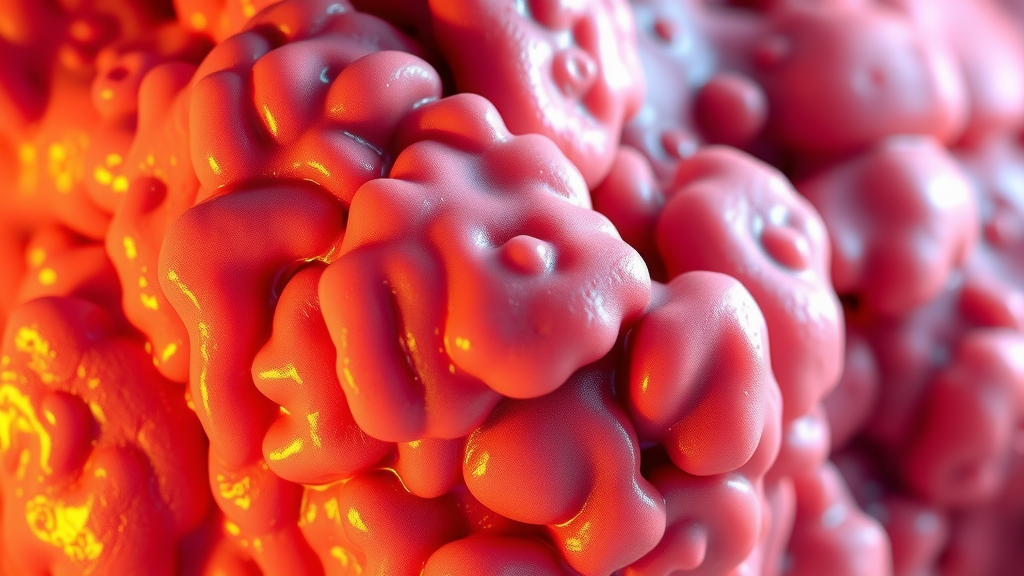
Chronic sinusitis, often referred to as chronic inflammation in the sinuses, affects millions globally, leading to significant disruptions in daily life. This persistent condition arises from underlying factors such as allergies and nasal polyps.
Common symptoms include nasal congestion, facial pressure, and headaches.
While traditional treatments often encompass medications, many individuals are exploring uncommon remedies for sustainable relief.
This exploration of alternatives is essential for managing symptoms effectively and discovering complementary therapies. Finding effective methods can significantly improve overall health and enhance quality of life.
‘Click here to learn more about:’ the ultimate anti inflammatory guide
Understanding Chronic Inflammation In The Sinuses
Chronic inflammation in the sinuses manifests as prolonged swelling, frequently triggered by allergies or infections.
The body’s immune response leads to the infiltration of immune cells into sinus tissues, resulting in symptoms such as nasal congestion and facial pain. This ongoing sinus inflammation thickens the sinus lining and increases mucus production, obstructing normal drainage.
Consequently, a favorable environment for sinus infection develops, fostering bacterial growth.
- Chronic sinusitis affects numerous individuals worldwide, presenting symptoms like headaches, nasal discharge, fatigue, and a diminished sense of smell.
- Factors contributing to chronic inflammation include allergies, nasal polyps, and recurrent respiratory infections.
- Effective treatment generally combines medical interventions, lifestyle changes, and home remedies aimed at alleviating *symptoms* and reducing inflammation.
- Seeking professional consultation for persistent symptoms is essential for proper diagnosis and effective management.
Environmental factors such as pollution, smoke, and allergens can exacerbate chronic inflammation in the sinuses. Maintaining good nasal hygiene through saline rinses aids in alleviating symptoms. A well-balanced diet rich in anti-inflammatory foods, including fruits, vegetables, and omega-3 fatty acids, supports sinus health. Engaging in regular physical activity can enhance immune function and potentially reduce inflammation.
Over-the-counter medications, like antihistamines and decongestants, may offer temporary relief from symptoms. Consider using a humidifier to add moisture to the air and soothe irritated nasal passages. Identifying and avoiding triggers, such as pet dander and mold, is beneficial. If home remedies prove ineffective, consulting an ENT specialist may be necessary for prescription medications or other interventions. Long-term management may include immunotherapy for allergies or surgical options for structural issues. Staying hydrated is vital to thin mucus and promote sinus drainage.

Common Symptoms Of Chronic Rhinosinusitis
Chronic inflammation in the sinuses, often referred to as chronic sinusitis, manifests through various symptoms that can significantly disrupt daily life. Nasal congestion is a predominant feature, frequently resulting in difficulty breathing and compromised sleep quality.
This congestion often impacts an individual’s ability to perform routine tasks effectively.
Facial pain and pressure are also prevalent, typically experienced around the forehead, cheeks, and eyes, leading to considerable discomfort during everyday activities.
Headaches accompanied by thick nasal discharge may further intensify these daily struggles, creating a cycle of discomfort and reduced productivity.
A reduced sense of smell not only lessens the enjoyment of food but may also contribute to feelings of social isolation.
Other symptoms include fatigue, which can be compounded by the overall stress of living with chronic sinusitis, and post-nasal drip, which can lead to additional complications such as throat irritation and persistent cough.
Effective management of these symptoms is essential for improving quality of life, necessitating a comprehensive approach that may include both medical intervention and lifestyle adjustments.
Effective Home Remedies For Sinus Pain
Exploring popular home remedies can provide significant relief from sinus pain associated with chronic sinusitis.
Here are some effective approaches:
- Saline nasal rinses: These are recommended for clearing mucus and promoting sinus health, providing swift relief from congestion.
- Steam inhalation: This method has been shown to soothe inflamed sinuses, helping reduce the associated symptoms of sinus inflammation.
- Humidifier usage: Keeping moisture in the air can help prevent irritation in the nasal passages, particularly during dry seasons.
- Natural anti-inflammatory foods: Incorporating options like turmeric and ginger into the diet may assist in alleviating chronic sinusitis symptoms.
- Staying hydrated: Proper hydration supports mucus clearance, ultimately promoting overall sinus health and enhancing well-being.
Maintaining good nasal hygiene through regular saline rinses can alleviate symptoms and prevent further complications. Avoiding triggers such as allergens, pollution, and smoke will also contribute to managing chronic sinusitis effectively. If home remedies do not yield satisfactory results, consulting an ENT specialist may lead to tailored treatments and management strategies.
Through a combination of remedies and professional guidance, individuals can find relief from the burdensome symptoms of chronic rhinosinusitis and improve their overall quality of life.
Chronic Rhinosinusitis
- Chronic rhinosinusitis affects approximately 12% of the adult population in the United States.
- Studies show that saline nasal rinses can improve symptoms in over 60% of patients with chronic sinusitis.
- Using a humidifier can reduce sinus inflammation and the frequency of sinus infections, particularly in dry climates.
- Natural anti-inflammatory foods like turmeric and ginger have been shown to reduce inflammation and improve overall sinus health.
Identifying The Causes Of Sinus Infections
Sinus infections, clinically known as sinusitis, stem from a variety of triggers that lead to discomfort and health issues. Environmental factors such as pollutants and allergens, including dust, mold, and pet dander, significantly contribute to sinus inflammation.
This inflammation can escalate into a chronic condition, increasing the risk of recurrent infections.
Anatomical issues, like a deviated nasal septum, can also obstruct sinus drainage, compounding the problem.
Symptoms associated with chronic sinusitis may include:
- Facial pain
- Nasal congestion
- Fatigue
- Headaches
- Reduced sense of smell
Recognizing these risk factors is essential for effective diagnosis and treatment. This proactive approach can improve overall sinus health and help reduce the incidence of future sinus infections.
The Role Of Allergies In Sinus Issues
Allergies can significantly exacerbate sinus problems by inducing inflammation in the nasal passages. When allergens, such as pollen or dust mites, are present, the body often reacts by increasing mucus production, which can lead to sinus blockage. Common symptoms may include:
- Nasal congestion
- Post-nasal drip
- Facial pressure
These symptoms create an environment conducive to the development of infections. Effective management strategies for allergies include:
Avoiding Triggers
Identify and steer clear of allergens that may worsen sinus conditions, such as pet dander and mold.
Medication
Utilizing over-the-counter antihistamines or corticosteroids can help reduce inflammation and alleviate symptoms.
Professional Consultation
Consulting with an ENT specialist is advisable for targeted therapies, ensuring optimal treatment for ongoing sinus issues related to allergies. This approach can lead to tailored solutions and improved quality of life for patients struggling with chronic sinusitis.
| Risk Factors | Symptoms |
|---|---|
| Environmental allergens (dust, mold, pet dander) | Facial pain |
| Anatomical issues (deviated nasal septum) | Nasal congestion |
| Chronic sinusitis | Fatigue |
| Allergies | Reduced sense of smell |
Diagnosis Techniques For Sinusitis
Accurate diagnosis plays a significant role in addressing chronic sinusitis to tailor effective treatment plans. Physical examinations conducted by ENT specialists can reveal essential insights into visible abnormalities such as swelling or discharge within the nasal passages.
Nasal endoscopy utilizes a flexible camera-equipped tube to visualize the sinus cavity directly, allowing for the identification of inflammation or blockages.
Imaging studies, particularly CT scans, offer a detailed view of sinus anatomy, thus assisting in diagnosing structural issues.
Allergy testing helps in determining allergen triggers that lead to sinus inflammation, which is fundamental for implementing targeted management strategies.
The Impact Of Nasal Polyps On Chronic Conditions
The presence of nasal polyps significantly influences the severity of chronic sinusitis, complicating both symptoms and treatment options. These noncancerous growths within the nasal lining can lead to increased nasal obstruction, exacerbating mucus retention and promoting chronic inflammation.
Medical treatments, including corticosteroids, are frequently employed to reduce polyp size and enhance airflow. Surgical options, such as endoscopic sinus surgery, may be necessary for larger polyps causing severe blockages.
Ongoing management strategies, including nasal saline rinses and lifestyle modifications, remain essential for maintaining sinus health and alleviating symptoms linked to nasal polyps.
Chronic Inflammation in the Sinuses
Chronic inflammation in the sinuses, commonly referred to as chronic sinusitis, is a persistent condition characterized by prolonged inflammation of the sinus lining.
This condition can lead to a range of uncomfortable symptoms that significantly affect an individual’s quality of life.
- Chronic sinusitis impacts millions globally, causing symptoms such as nasal congestion, facial pain, and pressure.
- Additional symptoms may include headaches, nasal discharge, fatigue, and a reduced sense of smell.
- Conditions contributing to chronic inflammation include allergies, nasal polyps, and recurrent respiratory infections.
- Effective treatment often combines medical solutions, lifestyle adjustments, and home remedies to alleviate symptoms.
- Consulting a health professional for persistent symptoms is crucial for accurate diagnosis and suitable management strategies.
Management and Remedies
Many strategies can help manage chronic sinusitis and reduce inflammation:
- Maintaining good nasal hygiene, including saline rinses, can alleviate symptoms.
- A balanced diet rich in anti-inflammatory foods, such as fruits, vegetables, and omega-3 fatty acids, may support sinus health.
- Regular physical activity can enhance immune function, potentially alleviating inflammation.
- Over-the-counter medications like antihistamines and decongestants may provide temporary relief from symptoms.
- Using a humidifier to add moisture to the air can soothe irritated nasal passages.
- Identifying and avoiding triggers such as pet dander and mold can help reduce symptoms.
- When home remedies prove ineffective, consulting an ENT specialist for prescription medications or further interventions may be necessary.
- Long-term management may involve immunotherapy for allergies or surgical options for structural issues.
- Staying well-hydrated is vital to thin mucus and promote sinus drainage.
Chronic Sinusitis
- Chronic sinusitis affects approximately 12% of adults in the United States.
- Studies show that nasal polyps are present in up to 40% of patients with chronic sinusitis.
- Effective management of chronic sinusitis can improve quality of life and reduce healthcare costs.
- Research indicates that a combination of medical and lifestyle interventions can significantly alleviate symptoms.
How Inflammation Affects The Sinus Tissue
Chronic inflammation in the sinuses, commonly known as chronic sinusitis, can have profound effects on sinus tissue health. The persistent inflammation leads to swelling in the sinus lining and subsequently results in blocked sinus cavities.
This blockage often causes discomfort and is exacerbated by increased blood flow and immune cell activity.
When inflammation remains unresolved, the tissue may thicken, contributing to ongoing symptoms, such as nasal congestion and facial pain.
Formation of Nasal Polyps
Chronic inflammation can also induce the formation of nasal polyps, which are noncancerous growths that obstruct sinus drainage.
These polyps can complicate the treatment of sinusitis and may necessitate surgical intervention. The thickened sinus tissue and nasal polyps further disrupt normal mucus flow, resulting in persistent symptoms and an impaired sense of smell.
Impact on Quality of Life
The effects of chronic sinusitis extend beyond physical symptoms.
Individuals may experience fatigue, headaches, and a reduced quality of life due to the ongoing discomfort. Recognizing the interplay between inflammation and sinus health is essential for effective management and alleviation of symptoms.
Treatment Options For Chronic Sinusitis
Effective management strategies for chronic sinusitis include a variety of treatment modalities designed to address individual symptoms.
These methods range from over-the-counter medications to lifestyle adjustments and prescribed treatments.
Medications
Over-the-counter medications such as antihistamines and decongestants can provide temporary relief from nasal congestion.
For persistent symptoms, prescription options, including corticosteroids, may be needed to control inflammation effectively.
Home Remedies and Lifestyle Changes
Incorporating home remedies like saline nasal rinses can maintain moisture in the nasal passages. Humidifiers also help to soothe irritated tissues by adding moisture to the air.
A balanced diet rich in anti-inflammatory foods, such as fruits, vegetables, and omega-3 fatty acids, supports overall sinus health.
Professional Consultation
Consulting an ENT specialist is crucial for those experiencing persistent symptoms. An ENT can provide comprehensive evaluations and recommend tailored treatment plans that may involve immunotherapy or surgical options for structural problems, such as a deviated septum or nasal polyps.
Long-term management may also require identifying and avoiding allergens that trigger symptoms, including pet dander and mold.
Staying hydrated is vital for thinning mucus and promoting sinus drainage, while regular physical activity may bolster immune function and reduce inflammation.
These integrated approaches contribute significantly to improving sinus health and alleviating the burden of chronic sinusitis.
Chronic Sinusitis
- Chronic sinusitis affects approximately 12% of the adult population in the United States.
- Nasal polyps occur in 20-30% of individuals with chronic sinusitis, complicating treatment.
- Effective management of chronic sinusitis can significantly improve quality of life and reduce symptoms such as fatigue and headaches.
- Hydration and a diet rich in anti-inflammatory foods can support sinus health and alleviate symptoms.
Lifestyle Changes To Reduce Sinus Congestion
Making intentional lifestyle changes can help alleviate sinus congestion, which is often linked to chronic sinusitis. Regular saline rinses are effective for maintaining nasal hygiene, as they help clear mucus and allergens without medication.
Using a neti pot or saline spray daily can yield optimal results.
Identifying environmental triggers, such as pollen or pet dander, is important.
Keeping windows closed during high allergen seasons and using air purifiers can be particularly beneficial.
A diet rich in anti-inflammatory foods like salmon and leafy greens may combat sinus inflammation. Staying hydrated is also crucial; aim for at least eight glasses of water daily to help thin mucus and enhance drainage.
The Connection Between Sinus Health And Asthma
A strong link exists between sinus health and asthma, with chronic sinusitis potentially triggering asthma exacerbations.
Poor sinus health can heighten the risk of asthma attacks due to inflammation affecting the airways. Recognizing symptoms associated with both conditions is essential; sinusitis typically presents with nasal congestion and facial pain, while asthma may manifest as wheezing and shortness of breath.
Prevention strategies can include:.
- Identifying allergens that impact both conditions, such as mold and dust.
- Maintaining good indoor air quality to alleviate symptoms.
- Consulting healthcare professionals regularly to ensure effective management of both sinus and asthma issues.
Effective management fosters better overall respiratory health and enhances quality of life.
Being proactive in addressing sinus health can offer relief from symptoms and mitigate asthma triggers, leading to improved respiratory function.
Sinus Health and Asthma
- Studies show that over 30% of asthma patients also suffer from chronic sinusitis.
- Regular saline rinses can reduce nasal congestion by up to 50% according to recent research.
- Air purifiers can decrease airborne allergens by 90%, improving overall indoor air quality.
- A diet high in omega-3 fatty acids, like those found in salmon, has been linked to reduced inflammation in the body.
How To Lower Chronic Inflammation | Easy Fixes
Chronic Inflammation Signs | Unseen Truths



